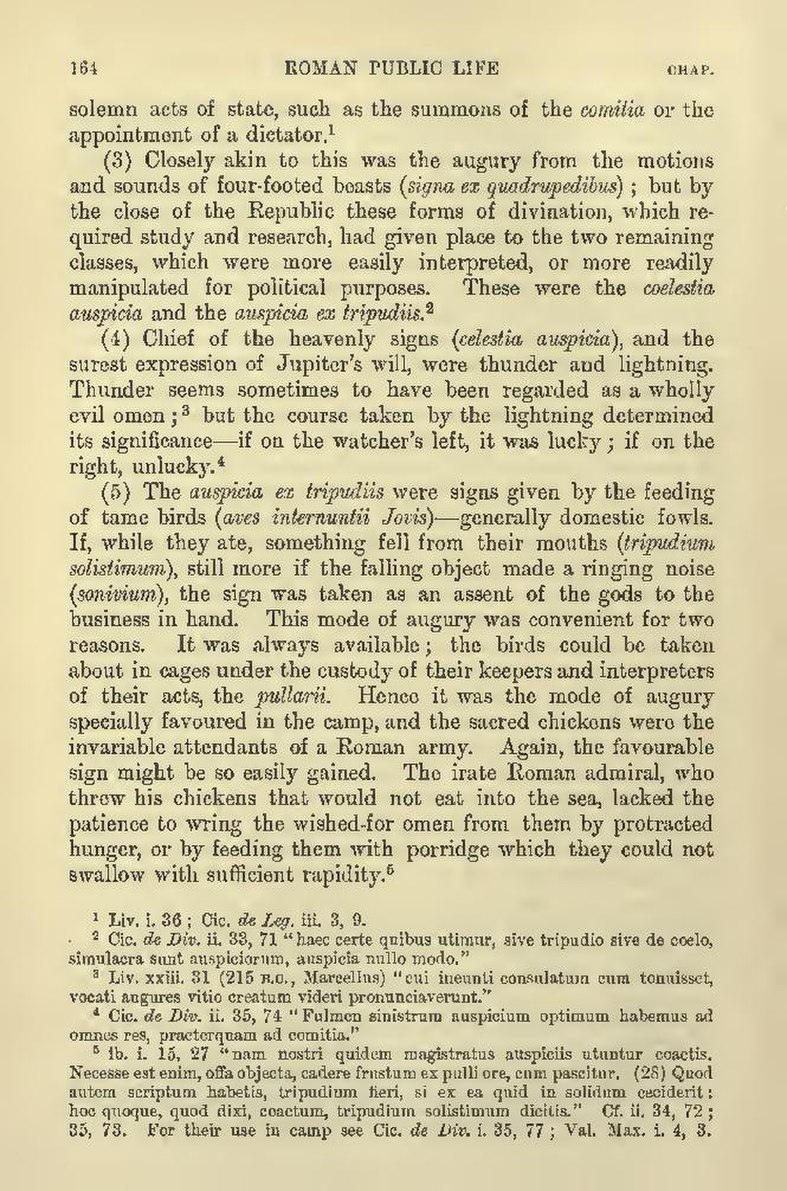solemn acts of state, such as the summons of the comitia or the appointment of a dictator.[1]
(3) Closely akin to this was the augury from the motions and sounds of four-footed beasts (signa ex quadrupedibus); but by the close of the Republic these forms of divination, which required study and research, had given place to the two remaining classes, which were more easily interpreted, or more readily manipulated for political purposes. These were the coelestia auspicia and the auspicia ex tripudiis.[2]
(4) Chief of the heavenly signs (celestia auspicia), and the surest expression of Jupiter's will, were thunder and lightning. Thunder seems sometimes to have been regarded as a wholly evil omen;[3] but the course taken by the lightning determined its significance—if on the watcher's left, it was lucky; if on the right, unlucky.[4]
(5) The auspicia ex tripudiis were signs given by the feeding of tame birds (aves internuntii Jovis)—generally domestic fowls. If, while they ate, something fell from their mouths (tripudium solistimum), still more if the falling object made a ringing noise (sonivium), the sign was taken as an assent of the gods to the business in hand. This mode of augury was convenient for two reasons. It was always available; the birds could be taken about in cages under the custody of their keepers and interpreters of their acts, the pullarii. Hence it was the mode of augury specially favoured in the camp, and the sacred chickens were the invariable attendants of a Roman army. Again, the favourable sign might be so easily gained. The irate Roman admiral, who threw his chickens that would not eat into the sea, lacked the patience to wring the wished-for omen from them by protracted hunger, or by feeding them with porridge which they could not swallow with sufficient rapidity.[5]*
- ↑ Liv. i. 36; Cic. de Leg. iii. 3, 9.
- ↑ Cic. de Div. ii. 33, 71 "haec certe quibus utimur, sive tripudio sive de coelo, simulacra sunt auspiciorum, auspicia nullo modo."
- ↑ Liv. xxiii. 31 (215 B.C., Marcellus) "cui ineunti consulatum cum tonuisset, vocati augures vitio creatum videri pronunciaverunt."
- ↑ Cic. de Div. ii. 35, 74 "Fulmen sinistrum auspicium optimum habemus ad omnes res, praeterquam ad comitia."
- ↑ ib. i. 15, 27 "nam nostri quidem magistratus auspiciis utuntur coactis. Necesse est enim, offa objecta, cadere frustum ex pulli ore, cum pascitur. (28) Quod autem scriptum habetis, tripudium fieri, si ex ea quid in solidum ceciderit: hoc quoque, quod dixi, coactum, tripudium solistimum dicitis." Cf. ii. 34, 72; 35, 73. For their use in camp see Cic. de Div. i. 35, 77; Val. Max. i. 4, 3.
